My one-man Field Day. off grid radio training
For amateurs who are into off grid radio for preparedness/emergency purposes, I have a blunt reality check for you: You’re probably not as prepared as you think you are. And you’re most likely not off grid radio training enough. Participating in Field Day once a year or occasionally operating from your deck doesn’t cut it. What should you be doing? Just as important, what should you not be doing? off grid radio training
It may surprise my readers to hear that I seldom participate in Field Day. My reason is simple: I get out with my gear often enough where having to set aside one special day for it isn’t necessary. I’m not motivated by contests, so with that as a non-issue, any time I’m operating off grid has the same benefits as the official Field Day. I can have a Field Day anytime.
The great outdoors. off grid radio training
I had a day off, the weather was awesome, so on a whim I decided to do some QRP in the field. The best times are unplanned, right? “The Field” in my case was just a few steps out my back door. My jab about operating from your back deck aside, you don’t have to travel great distances to practice your radio skills. Set up in the environment you are moist likely to be in when trouble strikes. For some of you that might be an apartment balcony. For others, it might be a large spread in the country. It doesn’t even have to be outdoors. Whatever your habitat is, work with it. off grid radio training
I ran into my first snag before I even stepped outside. My go-bag was in disarray. There were some missing parts that I had to hunt down. My bag also had parts I didn’t need. How did they get in there? And begging the the cat to stop treating my microphone cable like a chew toy was met with typical cat indifference.
Once I did get outside, setup was straightforward. Clever hams always give themselves antenna options. Mine are an Alpha Antenna FMJ, a homebrew random wire antenna, and some homebrew dipoles. Today I went with the FMJ. It’s the easiest to transport and set up. The radio, power source, antenna, everything, was ready to go in just a few minutes.
Another two problems were exposed. My go bag includes 50 feet of coax. That’s a lot to lug around, and I have never needed all 50 feet. Should I give up the flexibility of having a long coax in exchange for lightening the load? At the same time, my power cables from the radio to the external battery and from the battery to the solar panel are a bit short for my use. They store inside the battery box, and it’s already pretty crowded in there. Should I lengthen them, which would mean upgrading to a larger battery box and reducing portability? Or leave them as is, keep my smaller box, and deal with it? off grid radio training
I’ve known about both these issues for a while, but have been blowing them off. That’s not good. Blowing off problems, even seemingly small ones, can result in big hassles later. There is no set “correct” answer as long as you accept the drawbacks along with the benefits.
Power galore.
The strongest element of my portable setup is the power source. A ten amp-hour lithium battery paired with a 27 watt folding solar panel will push my FT817 radio for a very long time, even with full 5 watt output and a generous duty cycle. With the strong sun on this day, I could run completely off the solar while the battery just floated. It isn’t always this easy. Every plan should include provisions for at night or when the sun is not strong. If you are running a 100 watt radio, the complexity and size of your power generation will increase dramatically.
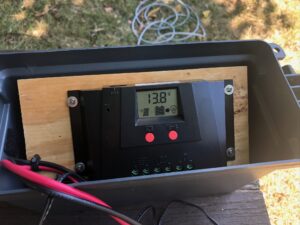
Strong voltage on the battery even while under load. The 27 watt solar panel is earning its keep today! ©2020 offgridham.com
In my opinion, the extra expense and effort needed to power a 100 watt radio off grid is seldom worth it, especially if portability is a main goal. We all have to make our own decisions and accept the tradeoffs. For me, QRP allows me to keep my go-station as light and simple as possible. QRP is something of an art form. It takes patience to master, but once you get the hang of it you will not miss the extra watts.
A day well spent.
Overall, my one man Field Day was productive. I identified some problems that will need to be addressed. I also was able to give that FMJ antenna a good workout. It’s my newest antenna and therefore the one I have the least experience with. The HF bands were not great, but I was able to make enough contacts to satisfy me that my system was working. No matter how long I do this, there is always something new to learn. It’s a good feeling to pack out at the end of the day knowing I’m a better operator for having done it. I’ll do this again soon, building on previous experiences.
What is holding you up?
Have you been neglecting your off grid radio training? There can be many reasons why, sometimes more than one reason. Some “cures” are simple, and others not so much.
Family commitments: Parents who were already busy now have the added demand of kids at home all day distance learning due to Covid. As if normal parenting duties were too easy, many of you are now ad hoc teachers too. Include the kids in your radio activities. It would be a great science project where they can learn about renewable energy, physics, math, and electronics.
Work commitments: Most of us do not control our work schedule. Working from home does not automatically translate into more personal time. There’s no easy out. All you can do is be sure to take all the paid time off you’re entitled to and practice good time management skills while on the job so you’re not always working late. This goes well beyond radio. It’s good for family life and relationships too.
Money: During these hard times, not having money for a radio hobby seems like a petty “First World problem.” And it is, up to a point. Don’t discount your mental health and personal satisfaction as petty. Beyond material needs, you have to take care of yourself by engaging in fun and interesting pastime activities. There are many low-budget projects on this and similar websites, and YouTube too. You might have to be creative and make compromises, but it can be done. off grid radio training
So what’s your next move?
Getting off the grid and practicing your skills should be a priority for any serious amateur. It does not necessarily have to take up a lot of time or money. I find that I get more from several short outings than I do from one long one. If time or money is an issue, look for ways around these issues instead of using them as an excuse not to do it at all. If all you have is one hour and a $35 handheld radio…fine. Get out there and make the best of it. Successful off grid amateur radio is and always will be more about skill than it is about stuff.
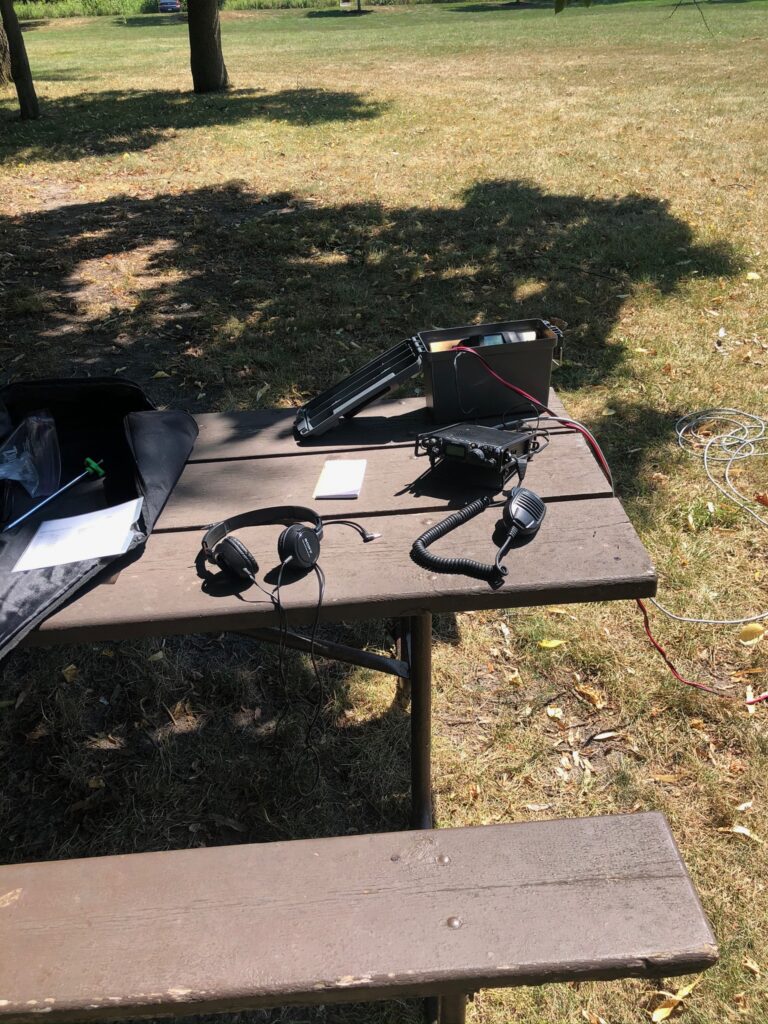
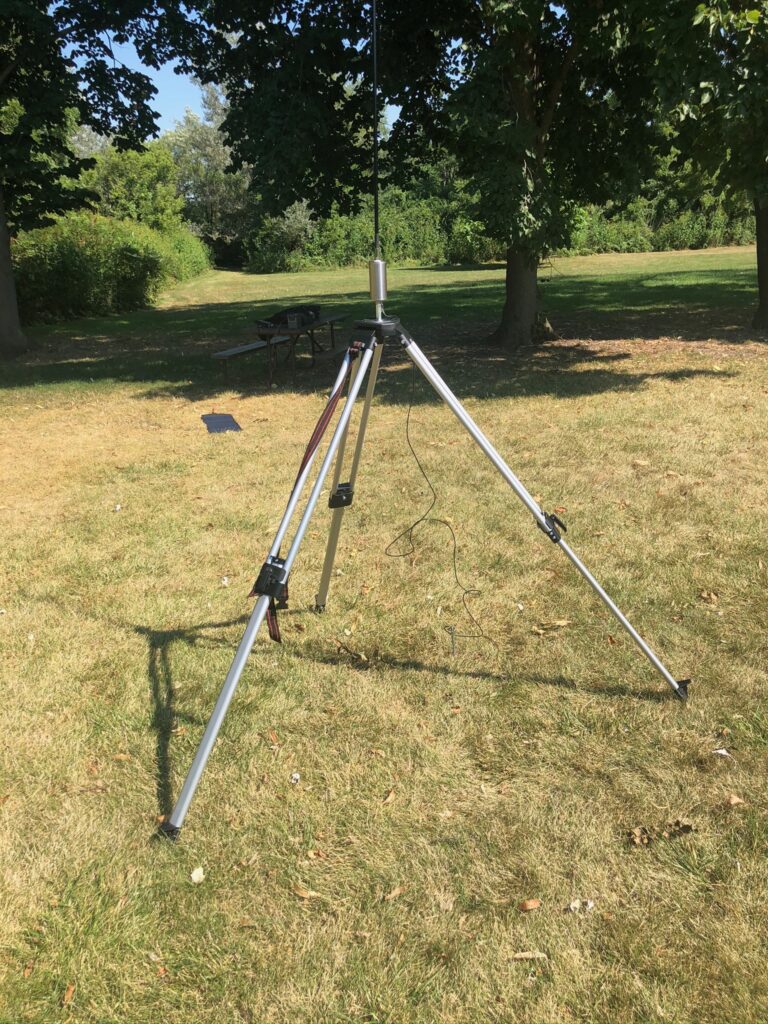
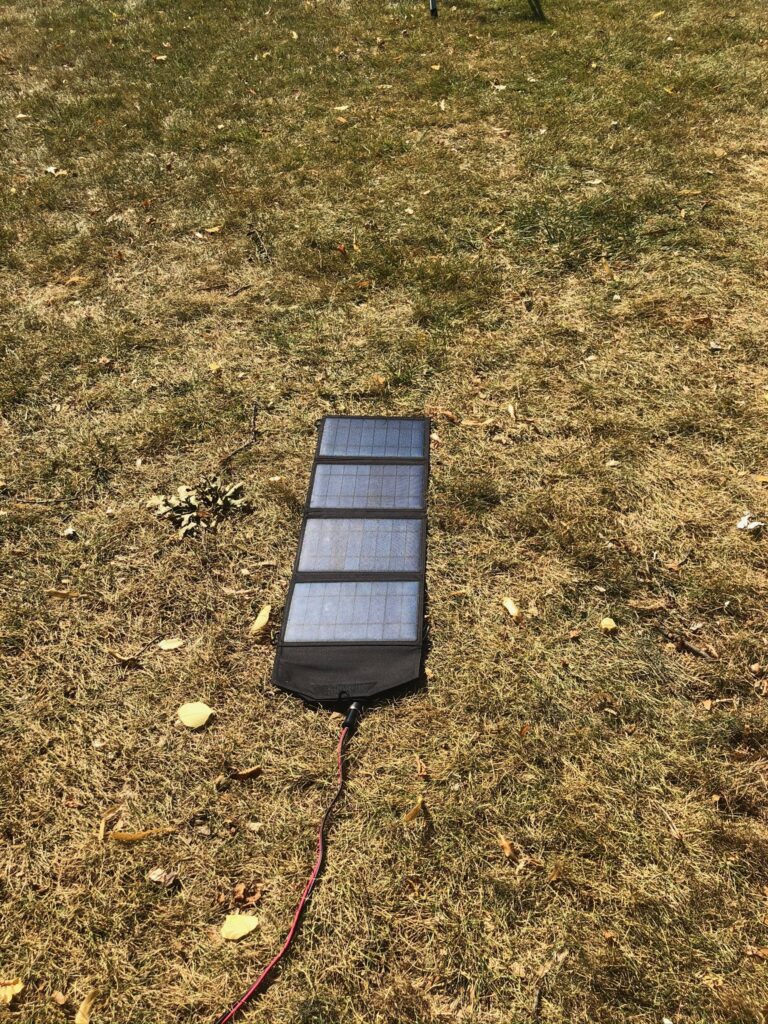
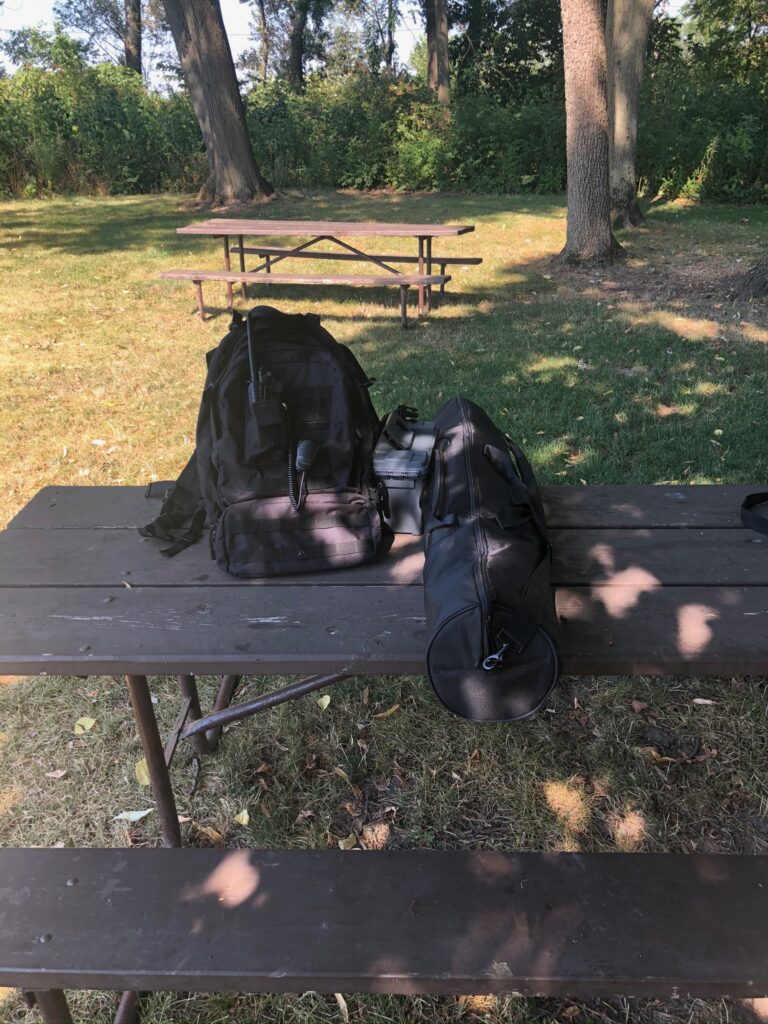
I’ve about given up on the radio stuff. The reasons are remoteness and severe terrain and our location in that terrain. We get no cell signal except within 6′ of the repeater with the antenna well above the roof. We can barely get one AM station as long as I am well away from any conductor AC or DC which is broadcasting interference from the solar. My scanner is useless except for anyone broadcasting somewhere within our canyon. I did have a wide band long wire hooked to a PRN-1000 receiver (Drake unit) but never received anything but that same faint radio station. A tree took it down and it was no big loss. Last year I put up a di-pole well above the roof. The results were disappointing for scanning but my range did increase to about 2.5 to 3 miles down the canyon. But it works great for the MURS zone alarms and has no problem with the interference.
I only write this to communicate the importance of site selection. My mistake was creating a project without having a full year of consideration. Even with better planning I had no idea of what I would want/need in the future.
We are half way up the north facing side. If I hiked up the canyon to the pasture on top I can see Mts Hood, Adams and sometimes what’s left of the top of St. Helens. And wow – a strong 3G signal! Another wholly different topic is sight selection and not just for radio reception – we lose all but cloud edge generation of solar for three months of the year. But, heh, I wouldn’t have a different spot. What we have is what we have.
You might want to consider NVIS (near vertical incidence skywave). It will not allow you to bag rare DX, but it will get you out several hundred miles and make HF worthwhile. NVIS is not difficult to do and is not effected by local obstructions such as mountains; you may already have the antenna needed to do it. There is an article about NVIS here on Off Grid Ham (use the search function).
Beyond that, yes site selection matters. But many people do not have the luxury of choosing a homesite based on its suitability for radio. This further stresses the importance of doing the best you can with what you have and not letting these situations be a reason not to do radio at all.
Chris, there’s a good article about NVIS at Ham Radio School’s website (https://hamradioschool.com/nvis/) that covers the basics. I have an off center fed dipole hanging at about 10 feet off the ground that works beautifully as a NVIS antenna on 80 meters. Something like that might help JRHill on the HV bands in his situation. I can cover almost all of Wisconsin, Illinois, Minnesota and Michigan , and a few states beyond that when conditions are right on 80 meters. But this is one case were power definitely helps. QRP isn’t going to work well. 100 watts + is going to be better for reliable NVIS.
Thank you for the tip. Yes, NVIS can be tricky and higher power helps but it can be done with QRP. I’ve done it up to about 450 miles with a fair level of reliability, although in my experience it works better at night.
I’m going to have to try QRP down on 80 meters using the NVIS antenna and see how that goes. I’ve just always assumed that because 80/75 is so prone to high noise and all the “local” guys claim you need at least 500 watts to do anything, I needed to fire up the amplifier in order to get out. Of course around here (and most places, it seems) the guys on 75 meters all seem to be engaged in some kind of “mine is bigger than yours” contest when it comes to power, blasting out the full 1,500 watts whether they need it or not.
NVIS is inherently a “low noise” system compared to traditional DX. Because the signal is not traveling as far, it is not in the atmosphere long enough to pick up as much noise. Think of it like walking in the rain: If you walk one block in the rain you will not get as wet as walking five blocks in the same rain. I hope this makes sense.
As for the “big gun” stations, I have nothing against a lot of watts, but you are right that power for pawer’s sake is unproductive. It then devolves into a pissing match to see who can overload who’s receiver. If that’s their thing, well ok, whatever. It’s not illegal nor is it necessarily poor operating protocol, but I don’t see the point.
Makes a lot of sense to me. As i get older i have scaled back my activities, cw and emcom are at the top of my list so i beleive this is a doable thing. Thank you for your good ideas. Keep it coming
De wb5eat
Thanks for your support, Bob!
I’ve never done ARRL’s Field Day and never really wanted to because it seems to be little more than just another contest as far as most of the participants are concerned. My wife is still in ARES so we periodically go through an assessment of emergency preparedness, backup power, equipment tests, etc. but for the most part I’m afraid we haven’t done much operating under actual simulated emergency conditions
The thing that irritates me about ARES and ARRL’s attitude in general is that they seem to be focusing more and more on high-tech and ever more expensive solutions to communications problems that are likely to fail under actual emergency conditions, and formalized training and protocols that, in an actual emergency, are going to collapse as well because almost no one on the air in an actual emergency is going to follow because they haven’t had the training.
I agree that technology for technology’s sake is a dead end. Furthermore, in a disaster situation operators are going to default to the easiest and simplest forms of communications, which means they’ll be on analog voice 99% of the time. That of course doesn’t mean digital modes are not worthwhile, it just means that they should not be the primary goal of disaster comms.
Don’t get me wrong, I love the technology. I haven’t used the mic on my radios in ages. I’m mostly using JS8Call these days or FT8. But when it comes to disaster prep, I’m a firm believer in KISS (Keep it simple, stupid).
I do get a kick out of the photos ARRL often publishes after Field Day showing guys with massive portable antenna towers pulled by huge trucks, RVs fully of gear, huge generators, and then look at my backpack with my FT-818, miniature CW key, battery and folding solar charger and mag-loop antenna, and a little laptop computer. I figure I have a heck of a lot more fun with that little rig then they do 🙂
Excellent article. Love to learn more
Hi David, thanks for the support!
What would be helpful is a list and/or performance reviews of the different types of equipment that can be utilized in off grid conditions.
Hi David, I do provide parts lists and links to DIY projects I write about on this website. I generally do not do reviews because there is already an oversaturation of radio-related reviews on the internet. I don’t see what I could add to the existing vast body of knowledge in this area.
David, go to Youtube and look up OH8STN Ham Radio. He does excellent videos about exactly that. 🙂